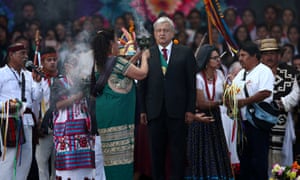Invoked by politicians in Mexico and Spain, the conquistador remains divisive
Sword at his side, banner in hand and left foot resting on the head of a vanquished Aztec deity, Hernán Cortés looks out over his hometown, as resolute in death and bronze as he must have been in life and steel.
Beneath the statue’s lion-studded plinth is the square that bears his name and the stone that marks the site of the house where he was born in 1485. On the wall outside the mayor’s office hangs a tapestry commemorating the 450th anniversary of the conquistador’s death.
Medellín, a picturesque town in southwest Spain, has never forgotten Cortés. But nor has Mexico. Five hundred years after the young Extremaduran began his conquest, his legacy remains deeply divisive.
At a press conference in November, Mexico’s populist president, Andrés Manuel López Obrador, responded to a question on his predecessors’ economic policies by invoking the country’s top historical villain.
“Hernán Cortés had barely disembarked in Veracruz and without any legal basis … he named himself mayor,” he said. “It was the first fraud.”
His comments on Cortés sparked a strong response – and exposed the faultlines of class and race that run under Mexican society.
The president, a keen student of history, often uses the country’s turbulent past to promote his political purposes. He has promised to put poor and indigenous people first and to strip the often overwhelmingly white Mexican elite of its privileges.
Opponents accused Amlo – as López Obrador is known – of not having his facts straight, arguing that no fraud could have been committed as Mexico did not exist as a country at the time.
Supporters, meanwhile, rallied around the president. One lawmaker from Amlo’s Morena party demanded that Cortés remains be removed from their resting place in central Mexico City, calling them “a point of infection that has only done damage to us”.
It was far from the first time that Amlo had pointed the finger at Cortés. In March, he marked the anniversary of the 1519 Battle of Centla – between Cortés’ men and the Mayan-Chontal people – by asking the Spanish crown and the Vatican to apologise for the conquest.
“They built their churches on top of the [indigenous] temples,” Amlo said. “The time has come to reconcile. But let us ask forgiveness first.”
The Madrid government rejected the call to apologise, insisting that the Spanish conquest of Mexico could not “be judged in the light of contemporary considerations”.
Spain’s far-right Vox party was rather less diplomatic in the face of an affront to one of its heroes: “Someone needs to tell this puffed-up mediocrity that Mexico’s been independent for 200 years and that he should stop picking fights with Hernán Cortés, who’s been dead for more than 400 years.”
Amlo’s opponents also refused to say sorry. By failing to do so, said Federico Estévez, a political science professor at the Autonomous Technological Institute of Mexico, they were wrongfooted into defending Spain rather than Mexico.
“He’s running a turkey shoot when it comes to these symbolic battles,” added Estévez. “And he’s winning every time.”
Amlo’s targeting of a historical villain came even as he appeared willing to do deals with a man seen by many as Mexico’s present-day antagonist. The president has deployed troops to stop Central American migrants and allowed the US to dump asylum seekers in Mexico in an apparent effort to appease Donald Trump.
“López Obrador will try to recover a little from this by associating himself with the national traditions and show that he’s defending the nation,” said Ilán Semo, historian at the Iberoamerican University.
“The conquest is fundamental in Mexican nationalism,” Semo said. “It’s the backbone of Mexican nationalism – which is based in a total attack on Cortés, on the Spanish world and in being anti-Hispanic.”
Cortés has traditionally been portrayed in Mexican murals as a monster, while the name of his indigenous lover and translator, La Malinche, has yielded the word malinchista, disdainfully applied to those who prefer all things foreign ahead of the domestic.
But the anniversary has triggered a strong interest to revisit the conquest. A TV series titled Hernán debuted amid enormous fanfare in November in Mexico and abroad via streaming services. Posters for the series have also been plastered across bus stops in Madrid.
“We were looking for a universal character, who would also generate a social conversation,” said the programme’s producer, Fidela Navarro.
“Hernán Cortés generates conversation on both sides of the Atlantic. In Mexico, there’s still pain and a lack of conversation and addressing what has been our common history; [in Spain] there’s been more indifference because they have the perspective of being the conquerors.”
In Medellín, too, people are using the anniversary to re-evaluate Cortés and his place in history.
“We’ve been holding events to mark the anniversary and to try to shine a bit of light on Cortés the man and his efforts,” said the town’s mayor, Valentín Pozo. “It’s about dispelling the myths and legends.”
The statue of Cortés, which can be seen through the mayor’s window, was vandalised nine years ago by a group who doused it with red paint and called for it to be torn down and replaced with a monument to all those killed in the conquest.
Pozo is adamant that the statue is going nowhere but admits to mixed feelings when he peers out of his office window.
“When I look at the statue, I feel proud – but I also recognise that things were done that shouldn’t have been done.”
Tomás García, Medellín’s official historian, has little time for Amlo’s calls for an apology from Spain.
“It’s like asking all of today’s Greeks to apologise for what Alexander the Great did or asking all today’s French people to apologise to the rest of Europe for Napoleon,” he said. “It’s known as presentism: it’s judging the events of five centuries ago by the standards of the 21st century.”
People would do better, said García, to recognise their own biases and accept that Cortés was simply the product of a very different age.
“Cortés has been used for political ends throughout history,” he said.
“In the 19th century he was a hero and a saint. Then he became a villain and a devil. He obviously wasn’t a hero or a villain or a saint or a devil. He was a man of his time who had to deal with the circumstances he was given.”
In any case, he added, Cortés was not just a conqueror but also an explorer, an entrepreneur, a writer – and a strategist and diplomat wise enough to know the value of alliances.
Perhaps the best description of Cortés, said García, was that offered by one of Mexico’s most famous poets.
“I think Octavio Paz got it very right when he said: ‘He was an extraordinary man – a hero in the old-fashioned sense of the word. It’s hard to love him but impossible not to admire him.’”





